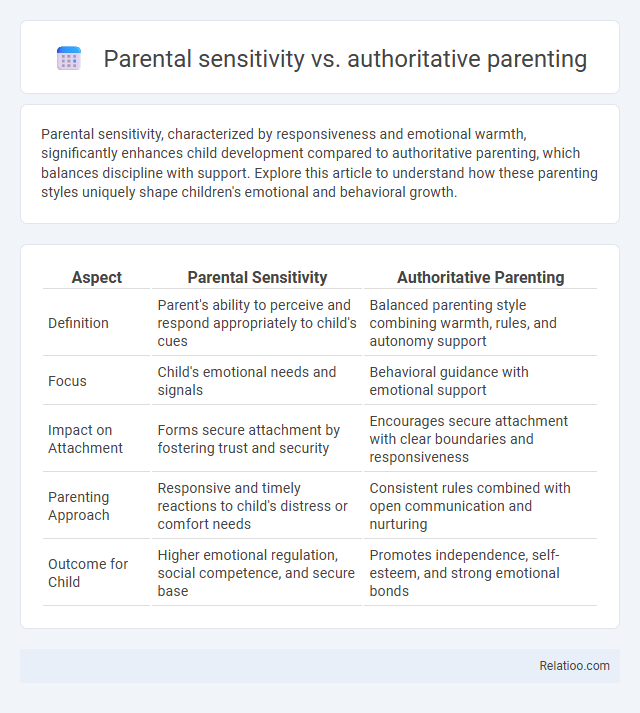Parental sensitivity, characterized by responsiveness and emotional warmth, significantly enhances child development compared to authoritative parenting, which balances discipline with support. Explore this article to understand how these parenting styles uniquely shape children's emotional and behavioral growth.
Table of Comparison
| Aspect | Parental Sensitivity | Authoritative Parenting |
|---|---|---|
| Definition | Parent's ability to perceive and respond appropriately to child's cues | Balanced parenting style combining warmth, rules, and autonomy support |
| Focus | Child's emotional needs and signals | Behavioral guidance with emotional support |
| Impact on Attachment | Forms secure attachment by fostering trust and security | Encourages secure attachment with clear boundaries and responsiveness |
| Parenting Approach | Responsive and timely reactions to child's distress or comfort needs | Consistent rules combined with open communication and nurturing |
| Outcome for Child | Higher emotional regulation, social competence, and secure base | Promotes independence, self-esteem, and strong emotional bonds |
Understanding Parental Sensitivity
Parental sensitivity refers to a parent's ability to accurately perceive, interpret, and respond promptly and appropriately to their child's emotional and physical needs, fostering secure attachment and healthy development. In contrast, authoritative parenting combines high responsiveness with clear boundaries and expectations, promoting autonomy while maintaining structure. Understanding parental sensitivity is crucial as it directly influences a child's emotional regulation, social competence, and overall well-being, often serving as the foundation for effective authoritative parenting practices.
Defining Authoritative Parenting
Authoritative parenting is defined by a balanced approach combining high responsiveness and high demands, where parents set clear rules while nurturing open communication and emotional support. This style contrasts with parental sensitivity, which emphasizes attunement to a child's emotional needs and cues without necessarily enforcing strict discipline. Studies indicate that authoritative parenting fosters better social competence and emotional regulation compared to parenting focused solely on sensitivity.
Core Principles of Parental Sensitivity
Parental sensitivity centers on recognizing and accurately interpreting your child's cues and responding promptly with warmth and support, fostering secure attachment and emotional regulation. Authoritative parenting balances high responsiveness with clear boundaries and expectations, promoting autonomy alongside guidance. Core principles of parental sensitivity emphasize attunement, consistent emotional availability, and empathetic communication to nurture your child's social and emotional development effectively.
Key Features of Authoritative Parenting
Authoritative parenting is characterized by high parental sensitivity combined with clear expectations and consistent discipline, promoting a supportive and structured environment for children. This parenting style balances responsiveness with demandingness, encouraging open communication and fostering autonomy while maintaining boundaries. Your child's emotional well-being and social competence are nurtured through this optimal blend of warmth, guidance, and responsiveness.
Emotional Responsiveness in Both Approaches
Parental sensitivity emphasizes recognizing and responding appropriately to a child's emotional cues, fostering secure attachment and emotional regulation. Authoritative parenting combines sensitivity with clear boundaries and consistent discipline, promoting emotional responsiveness alongside autonomy and social competence. Both approaches highlight the importance of emotional attunement, but authoritative parenting integrates this with structured guidance to support holistic child development.
Discipline Styles Compared
Parental sensitivity emphasizes recognizing and responding appropriately to a child's emotional needs, fostering secure attachment and emotional regulation, while authoritative parenting combines warmth and firm boundaries, promoting independence and social competence through consistent discipline. Discipline styles associated with parental sensitivity often involve gentle guidance and emotional support, contrasting with authoritative parents' clear expectations paired with reasoning and positive reinforcement. Research indicates that discipline practices focusing on empathy and responsiveness contribute to better developmental outcomes than those relying solely on control or punishment.
Impact on Child Development
Parental sensitivity, characterized by responsive and attuned caregiving, significantly fosters secure attachment, emotional regulation, and social competence in children. Authoritative parenting, which combines warmth with firm limits, promotes higher academic achievement, self-esteem, and positive behavioral outcomes. Your choice between these approaches directly influences your child's cognitive growth, emotional well-being, and long-term developmental success.
Benefits of Parental Sensitivity
Parental sensitivity, characterized by promptly recognizing and responding to your child's cues, fosters secure attachment and emotional regulation, leading to better social and cognitive development. Unlike authoritative parenting, which combines demandingness and responsiveness, parental sensitivity specifically enhances your child's trust and emotional well-being through consistent empathy and support. Research shows that children with sensitive parents exhibit lower stress levels and higher resilience, emphasizing the critical role of parental sensitivity in healthy development.
Strengths of Authoritative Parenting
Authoritative parenting is widely recognized for its balanced approach, combining high responsiveness with high demandingness, which fosters children's social competence and academic achievement. This parenting style promotes open communication and nurtures independence while maintaining clear boundaries and consistent discipline. Research shows children raised by authoritative parents tend to develop better emotional regulation, self-esteem, and problem-solving skills compared to those with less involved or more punitive parenting styles.
Choosing the Right Approach for Your Family
Parental sensitivity involves responding promptly and appropriately to your child's needs, fostering a secure emotional bond and promoting healthy development. Authoritative parenting balances warmth and structure by setting clear rules while encouraging independence and open communication. Choosing the right approach for your family depends on understanding your child's temperament and your parenting goals, ensuring a supportive environment that nurtures growth and resilience.

Infographic: Parental sensitivity vs Authoritative parenting
 relatioo.com
relatioo.com